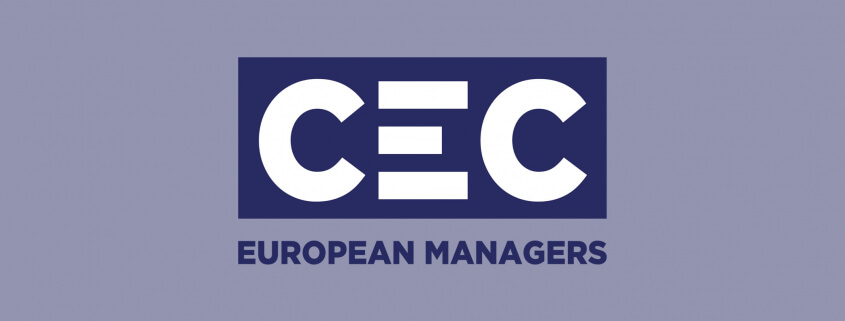Eurocadres General Assembly – Speech of Ms. Annika Elias, President – November 2014
The speech of Annika Elias, President of CEC European Managers, at the General Assembly of Eurocadres in November 2014.
Dear friends,
I am very happy to be here for your General Assembly, and thankful for you choosing to invite me as a guest speaker to this very important moment of your association life. Just a little more than a year ago I was standing on a similar stage, in a different meeting room but still here in Brussels, in front of a similar public, greeting Eurocadres’ then outgoing President Carlo Parietti and celebrating the 20th anniversary of the foundation of your Organization.
Many things have changed since, both externally to our Organisations and in the way our mutual relation has improved. Europe has overcome (some might say survived) a very difficult test last spring, successfully electing new political leaders and renewing its institutions. European elections have not resulted in that landslide of Euro-skeptical parties we all very much feared, but did clearly show the disenchantment of many European citizens, and have put on us the . If we look at the state of our economies and societies, the effects of the crisis are still very visible, and the often announced signs of a steady and uniform recovery have not materialized yet. To put it in the same words used by the European Commission in its recently published Autumn Economic Outlook, “the GDP growth struggled to gather momentum” in the first half of 2014, and “it is becoming harder to see the dent in the recovery as the result of temporary factors only”.
As far as our relations are concerned, this year saw the successful completion of the first joint European project CEC and Eurocadres (together with other partner organizations) have obtained in recent years. Some of you have participated in the Conference we organized last June in Cannes, and hopefully all of you have heard of the debates and conclusions discussed there through your national or professional Organizations. The project on women’s leadership is now almost complete, and soon its results will be made public; eventually, a presentation event will be organized early next year, to give the right resonance to something we are very proud of. Not only because of the contribution we believe the study will bring to an issue of big importance for us managers and professionals such as the share of women reaching managerial positions in their work environments. This project has been the demonstration that a structural, content-oriented cooperation between our Organizations is not only possible, but very much mutually beneficial. And I am not only talking about the “practical” aspects of this cooperation, but I am referring precisely to the aspect of the issues and values behind them. Later in the day, we will participate to the closing conference of the other project Eurocadres and CEC, together with other partners, have completed this year – the project on the role of professionals and managers in shaping CSR strategies. Again, another accomplishment we are very proud of, which shows that our two Organizations can work well together and share fundamental positions concerning the role and expectations of the category of workers we represent. I am sure that these two examples represent the first leg of a continuous and mutually advantageous path of cooperation to which, I can guarantee, my Organization is fully committed.
Even if with the differences that we know exist between us in terms of professional status of the people we speak for or stance towards other union forces, our Organizations share a common objective: to represent and defend the interests, needs and prerogatives of managers and professionals, as members of a specific component of the workforce whose distinctive trait is to act as a bridge between the two sides of the industry. The affiliates to our Organizations are those who are asked to ensure the continuity and the good functioning of the businesses they work for, taking difficult decisions and coordinating the work of tens and sometimes hundreds of co-workers. This specificity, I believe, deserves to be acknowledged and respected by both the other social partners and institutions (European as well as national ones), and so does our legitimacy to be present and heard at the same level as all the other representatives of social forces. As recognized social partners, we are all entrusted with a great responsibility: meeting the high level of political openness the current European Commission has demonstrated towards social dialogue and its role in ensuring the good functioning of the social market economy. In these times of change, we believe that all social partners have to work hard to prove their ability to deliver concrete results in a spirit of true cooperation and constructive debate. We are ready to play our part in this process, to which the Commission intends to give new momentum in the anniversary of the launch of the Val Duchesse dialogue, and we will make sure that our voice can be heard in that occasion, too.
Before I come to the end of my intervention, let me address a few words of sympathy and gratitutde to Martin, your President, for the invitation and the welcome. I am very happy that we have been able to develop a friendly relationship, and that we both agree on the necessity to have our Organizations work more, more closely and more regularly together. I am confident that we will be able in the years to come to achieve ambitious results, in terms of projects but also in terms of increasing the autonomous visibility of managers and professionals in Europe.
Thank you all for your kind attention. I wish you all, delegates and guest, fruitful discussions.



